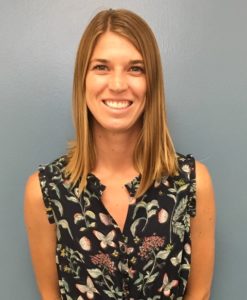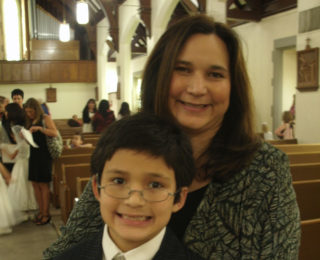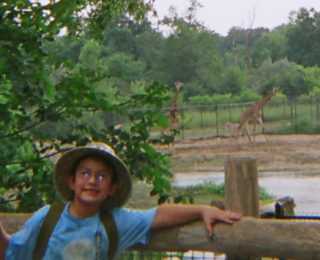Megan Knapp, MA, BCBA, is a Board Certified Behavioral Analyst specializing in children on the Autism Spectrum (ASD). She started her career with a private agency, doing one-on-one in-home therapy. Megan then moved into the public sector, becoming an Instructional Assistant in a special education classroom. In her next role, she became the Lead Behavior Interventionist, supervising the Instructional Assistants and other staff that worked directly with the students. Recently, Megan moved to a new school district where she is the Clinical Specialist Supervisor for supervision of all direct services.
“The Autism world has progressed so much in the last 15 years and is continuing to grow”
TLJ: What drew you to this profession, Megan?
MK: This is kind of a long story… I originally got my bachelor’s degree in Speech, Language, and Hearing Sciences because I wanted to be a speech pathologist and do speech therapy. When my dad was really sick, he went through a bunch of different therapies while he was finalizing some of his treatment in chemotherapy and those types of things. He received a whole battery of therapies. One of the therapies he received was speech therapy, and I was able to observe, and I thought it was a really cool field and I would like to do that. So, I did my bachelor’s degree in Speech, Language, and Hearing Sciences since it was a pre-req for becoming a speech pathologist.
“I thought it was a really cool field”
When I was coming up on graduating with my bachelor’s degree, I met with my counselor and asked what are some jobs I can do with just a bachelor degree. Generally when becoming a speech pathologist, you would go straight into a master’s program in that field. I was not ready to go straight to grad school yet. One of the fields she suggested was working with kids on the Autism Spectrum. She recommended getting a background in ABA therapy and providing behavioral therapy, especially if I was going to become a speech pathologist. Children with Autism would be a huge demographic that I would be working with as a speech pathologist. I took a job in the private sector doing direct service of ABA therapy. I was exposed to a lot of different environments which led me to pursue my master’s degree and my BCBA.
“This path led me to where I am now”
TLJ: What does your current role look like?
MK: Currently, I am working as an Autism Specialist in the public sector. I service students on the Autism Spectrum. ASD usually comes with multiple diagnosis across the full spectrum, impacting some severely. I have worked with the most profound to the highest functioning children and those in-between. When there is a student in the public sector who is diagnosed on the spectrum, by law as a public school, we have to provide them a specific amount of services based on their diagnosis.
“There is no cure for Autism”
Unfortunately, there is no cure for Autism. There is intervention, and therapy, and treatment that you can provide to assist as students progress with the diagnosis. So, when it comes to Autism, the main thing you will hear about is behavioral therapy or the use of applied behavioral analysis, or people just call it ABA therapy. I have been one of the service providers that deliver the ABA therapy in the private and public sector.
When you have your special education classrooms, you have your special education teacher with the class, then you have your instructional assistants that work in the class. I am one of the staff members that goes across the district and trains staff that work with our students. Collaborating with teachers on building up the programs for our students on the spectrum is something I also provide, along with consultation when it comes to determining IEP goals and working with challenging behaviors and those type of things. I do all of that district-wide, along with staff management, staff evaluations, and consultations. So, in a nut shell, that is what I do.
TLJ: What is your impression of the current climate of ASD in the classroom?
MK: It depends on the teacher. For instance, if you are working with a 3rd grade general education teacher, and all of a sudden a high functioning kid on the spectrum has been placed in their class because the student is now mainstreaming; it can be challenging for them because obviously they didn’t go to school to be a special education teacher. So, they are not used to having students with disabilities in their class, versus the special education teachers who went to school to do that.
“Special education teachers are very compassionate, and you can tell they have found their calling”
Special education teachers are very compassionate, and you can tell that they have found their calling, and that is to work with these type of students. The teachers within the special-ed field love it. They have put their hearts and souls into it and are changing the lives of the students they work with. So, being able to work in the public school setting, and seeing the big divide, especially when we talk about inclusion, and we talk about acceptance; there still is a huge divide between the students that are your typically developing kids and the students with special needs. Being able to bridge that gap has been, and probably will always be, the biggest challenge. You think in the public school setting they are all pro-inclusion. It’s a huge thing that they preach, it’s just something that is easier said than done.
“It’s just something that is easier said than done”
TLJ: Do you feel there is enough education for general education teachers when they have a special needs student placed in their classrooms? Or at least access to it?
MK: Yes and no. It is kind of like a constant battle. At our district there is not a designated person who specifically goes and trains just the general education teachers. The only time a gen-ed teacher would get access to specialized training is when a student is placed in their classroom who sits on the spectrum, and one of the specialists happens to come by and provide additional training. The specialized training in the gen-ed department is minimal at best in this area. Most of the resources get pushed into the special education setting. There is a high need for more training in the gen-ed setting and it is something our district is trying to do more of. It just comes down to resources and availability. It could be someone’s full time job, but unfortunately, there is a lack of resources.
TLJ: Megan, do you feel we are missing something that could help all children in a classroom?
“There are so many basic skills that some kids don’t learn”
MK: There are so many skills, that in general, we don’t teach. We often just focus strictly on academics. We are missing the entire other side of basic childhood development. Sadly, some kids don’t get taught how to plan for something, or how to self-regulate if you’re upset, or how to identify if they are sad or angry. There are so many basic skills that some kids don’t learn. All kids can benefit from learning tools to help with these issues.
TLJ: What do you think the future might look like regarding potential advances in the special education arena, both for students and for teachers?
MK: The nice thing is that in the field there is a lot more awareness of kids on the spectrum, and it’s not seen by society as a bad thing. The acceptance of the disability and the disorder is more out there. I feel like as individuals that work in education, and people in general, we are going to have to adapt to accommodate the number of people that are affected by ASD.
“You will have kids that you play basketball with and one of them happens to have Autism and it won’t be seen as a negative thing”
As we grow, it will just become something that is part of society. It will be a normal thing that you have kids in the class who sit on the spectrum. You will have kids that you play basketball with and one of them happens to have Autism and it won’t be seen as a negative thing. And as society continues to grow, and there is more awareness out there, and people are open to it and know more about it, and are more educated, we will continue to evolve with that, hopefully. I’m hoping that is what’s going to happen, and that for each next generation, it will continue to become a better opportunity for everyone involved. I can’t single handedly do that, but I will try.
TLJ: Do you feel your experience professionally has affected your life personally or your perspective in anyway?
“I have learned not to sweat the small things”
MK: I feel like I have always been a patient person, but I think that my patience level has definitely increased and I have a lot more compassion for people in general and feel very thankful for the abilities I do have. Since I do have knowledge in this field, I want to support as many people as I can. And at the end of the day, provide the best quality of life for our students; and not just the students I work with, but for potentially other students or for anyone who needs that type of support. I am a much more patient person and I have learned not to sweat the small things.
“I have become a much more compassionate individual”
TLJ: What do you do for fun to keep your life balanced?
MK: [Laughs] I drink a lot of wine, just kidding. Ben and I like to go camping and hiking. My favorite place to hike is Yosemite. I 

 love reading a good book and enjoy some nice fictional stories. I also love to cook and have become quite the chef. My favorite dishes to cook at the moment are Turkey Meatballs with Zucchini Noodles and Almond Chocolate Zucchini Bread. And, I am hoping to get a puppy soon to spend time with.
love reading a good book and enjoy some nice fictional stories. I also love to cook and have become quite the chef. My favorite dishes to cook at the moment are Turkey Meatballs with Zucchini Noodles and Almond Chocolate Zucchini Bread. And, I am hoping to get a puppy soon to spend time with.
TLJ: What would you say to any general education teacher having a child being mainstreamed into their classroom? How about for a parent?
MK: For teachers:
- Don’t be shy to ask for help
- Ask questions to sharpen your skills
- Don’t be afraid to make a mistake, it’s ok if you try something and it doesn’t work
- Be patient
- Seek help when you need it
For parents:
- Accept the help
- Don’t be timid about getting services or afraid that there are not services for yourself and your child
- Find your support system, you will need it, when you need it
A lot of our parents may be in denial or embarrassed. But in the end, this is your kid. You need to help them, and you need to be 100% just like your kid.
Megan, thank you for sharing your story.




